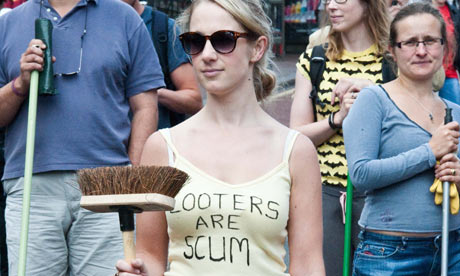It all started in Spain, on the 15 May (15M) Movement that went to the streets in the mayor Spaniard cities to demonstrate against the austerity measures and the banking system that provoked the financial crisis. Marching as a form of protests is not new, but this time it didn't end in just a march, Los Indignados (The Outraged) stayed on La Puerta del Sol, one of the main squares of Madrid, and the occupy movement started. Now on the 15 October (15 O) The movement went global.
The 15M movement transformed itself to the Democracia Real Ya! (Real Democracy Now) movement, and a peaceful ocupy of Madrid and other cities begun. They created groups of discussion to try to find a Manifesto that could represent the views of all who were protesting, which were from all ages and social classes. This discussion groups are trying to not only complain but start producing proposals for a change.
It was not many day after 15 May that the movement started to spread, the first ones to adopt it were the Greeks, another country who has been severely affected by the economic crisis, or perhaps just because they remembered that that form of direct democracy and discussion groups in public spaces were how they used to run things in the Socrates' Athens. So even when not returning to the Agora, they went to Syntagma Square. I was lucky to be on Athens during the summer protests and talk to some of the people who are occupying the square, and I notice that their ideas and worries were the same as in everywhere else.
More protests around the world started to happen, march, strikes, all asking that the world of inequality, greed, and rampant capitalism that makes the rich richer and the poor poorer, and decimates the middle class; to finish.
Finally the movement surprisingly moved to the country where that gap between the richer and the poorer is worst than anywhere else in the world, the USA. And people went out to occupy the financial centre of the country, Wall Street. And so the Ocuppy Wall Street movement started.
It was unavoidable that in the era of communications, internet and the social networks for this not to become a global phenomena, specially because the flawed economic system exists globally, as it's the inequality and social problems associated with it.
I participated of the 15O Occupy London protests, and I was very happy to see people coming out to the streets to say that enough is enough. As with the aforementioned protests around the world, discussion groups were created to decide the next steps of the movement and to start to find solution, that could work locally in the UK and also could make a global change. As to yesterday there were no major violence problems with the police, who surrounded the area of the protest around Saint Paul's Cathedral, since the protesters were not allowed to occupy the London Exchange Market. A few moments were it seemed that confrontation was going to start ended being controlled, with the speakers asking the rest to sit and stay peaceful.
Personally, I found the experience very powerful, not only for it's significance on the UK, but to know that the same was happening in all the major cities of the planet. From Sydney, Tokyo following the earth spinning all the way to Vancouver the world said with one voice, we are tired, this has to change.
A fried of mine asked me some interesting questions, which I'm sure are on the mind of many people right now. What does this vague 'anti-capitalism' mean? What is the movement pro? How can anything be achieved by this when nothing is being asked for? How can a whole economic system be opposed without proposing an alternative (what?) and what is wrong with social democracy within an overarching Capitalist economy?
It's difficult to give a single answer. The movement even when global it has different priorities locally, In Australia they included the rights of the Aboriginals, in Tokyo they speak against the nuclear energy plants, in Mexico they talked about ending the corruption and the drug traffic violence. In London there were talks about the NHS and the University fees. So, there was punctual objectives and things people were asking for.
The movement is not anti-capitalism per se, is anti the current form of capitalism, against a system that makes the gap between rich and poor bigger each passing day, which has not help the poorer countries of the world to get out of their situation. Is not against corporations and banks in general, is against those corporations and banks who put profit before anything else, before social responsibility, before safety, before environmental responsibility, etc.
Now, the work and discussion groups are going to try to answer what is the alternative and propose actions, everyone is invited to go and join, everyone can think on alternatives and put them on the table for discussion and agreement, so let's be pro-positive, and let's make the change by ourselves, not waiting that things are changed by others or by a government that is not working for the interests of the majority.
This is just the beginning and is for the population of this planet to decide where to go.
Check more pictures of the 15O in London on my picassa album HERE
The 15M movement transformed itself to the Democracia Real Ya! (Real Democracy Now) movement, and a peaceful ocupy of Madrid and other cities begun. They created groups of discussion to try to find a Manifesto that could represent the views of all who were protesting, which were from all ages and social classes. This discussion groups are trying to not only complain but start producing proposals for a change.
It was not many day after 15 May that the movement started to spread, the first ones to adopt it were the Greeks, another country who has been severely affected by the economic crisis, or perhaps just because they remembered that that form of direct democracy and discussion groups in public spaces were how they used to run things in the Socrates' Athens. So even when not returning to the Agora, they went to Syntagma Square. I was lucky to be on Athens during the summer protests and talk to some of the people who are occupying the square, and I notice that their ideas and worries were the same as in everywhere else.
More protests around the world started to happen, march, strikes, all asking that the world of inequality, greed, and rampant capitalism that makes the rich richer and the poor poorer, and decimates the middle class; to finish.
Finally the movement surprisingly moved to the country where that gap between the richer and the poorer is worst than anywhere else in the world, the USA. And people went out to occupy the financial centre of the country, Wall Street. And so the Ocuppy Wall Street movement started.
It was unavoidable that in the era of communications, internet and the social networks for this not to become a global phenomena, specially because the flawed economic system exists globally, as it's the inequality and social problems associated with it.
I participated of the 15O Occupy London protests, and I was very happy to see people coming out to the streets to say that enough is enough. As with the aforementioned protests around the world, discussion groups were created to decide the next steps of the movement and to start to find solution, that could work locally in the UK and also could make a global change. As to yesterday there were no major violence problems with the police, who surrounded the area of the protest around Saint Paul's Cathedral, since the protesters were not allowed to occupy the London Exchange Market. A few moments were it seemed that confrontation was going to start ended being controlled, with the speakers asking the rest to sit and stay peaceful.
Personally, I found the experience very powerful, not only for it's significance on the UK, but to know that the same was happening in all the major cities of the planet. From Sydney, Tokyo following the earth spinning all the way to Vancouver the world said with one voice, we are tired, this has to change.
A fried of mine asked me some interesting questions, which I'm sure are on the mind of many people right now. What does this vague 'anti-capitalism' mean? What is the movement pro? How can anything be achieved by this when nothing is being asked for? How can a whole economic system be opposed without proposing an alternative (what?) and what is wrong with social democracy within an overarching Capitalist economy?
It's difficult to give a single answer. The movement even when global it has different priorities locally, In Australia they included the rights of the Aboriginals, in Tokyo they speak against the nuclear energy plants, in Mexico they talked about ending the corruption and the drug traffic violence. In London there were talks about the NHS and the University fees. So, there was punctual objectives and things people were asking for.
The movement is not anti-capitalism per se, is anti the current form of capitalism, against a system that makes the gap between rich and poor bigger each passing day, which has not help the poorer countries of the world to get out of their situation. Is not against corporations and banks in general, is against those corporations and banks who put profit before anything else, before social responsibility, before safety, before environmental responsibility, etc.
Now, the work and discussion groups are going to try to answer what is the alternative and propose actions, everyone is invited to go and join, everyone can think on alternatives and put them on the table for discussion and agreement, so let's be pro-positive, and let's make the change by ourselves, not waiting that things are changed by others or by a government that is not working for the interests of the majority.
This is just the beginning and is for the population of this planet to decide where to go.
Check more pictures of the 15O in London on my picassa album HERE




























